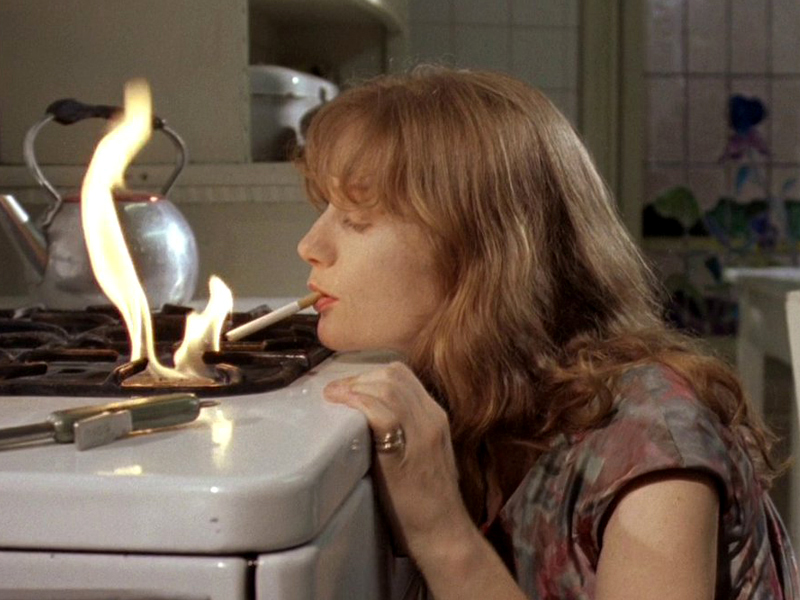
“In Ivan I have lived, in Malina I will be dying.” This is the unusual story of the triangular relationship of a woman who lives with a man named Malina in Vienna. She is infatuated when she meets Ivan, who is going to be her last passionate love. Her feelings are so strong and all-encompassing that Ivan can neither understand nor return them. Love is all this film is about, showing the loneliness of the one who loves.
“On a psychoanalytic level Ivan is a projection of a desire for absolute erotic love, while Malina represents the rational male alter-ego that clashes with the female emotional ego and finally obliterates the female identity – suggesting that it is only possible to be a writer at the expense of femininity and desire. Huppert’s tour-de-force performance of exaltation and self-destructive despair is familiar from Schroeter’s repertoire, and so is the film’s nonlinear narrative with its operatic climaxes – albeit now psychologically motivated as nightmares and hallucinations.”
Ulrike Sieglohr1
“Death Styles: That was Ingeborg Bachmann’s name for her three-volume novel series that she wrote in the 1960s. Malina was supposed to the be overture, a ‘story within the self.’ The novel was published in German in 1971 by Suhrkamp publishing house. It was to be the only novel published from a completed manuscript during the poet’s lifetime. All others remain fragments. [...] Austrian author Elfriede Jelinek wrote the script for a successful film adaptation of the work, directed by Werner Schroeter in 1991. For Jelinek, Bachmann was the first woman after WWII who used ‘radical poetic means’ to highlight ‘the ongoing effect of the war, torture, and extermination within society.’”
Deutsche Welle
“Malina catches the profuse, prolific, prodigious, and prodigal imagination of its protagonist – the enormous energy of creation and clamor of thought that are inseparable from the writer’s moment-to-moment whirl of daily activity. It does so with a surprising and canny economy of means that’s all the more remarkable given the torrential genius that Bachmann displays in the novel, which is a masterwork of rare imaginative power. (The novel was republished by New Directions in 2019, in Philip Boehm’s revision of his own 1990 translation, with an introduction by Rachel Kushner.) Like the movie, the novel is the story of an unnamed female writer; unlike the movie, it’s narrated in the first person, and, as such, it’s one of the great portraits of a mind at work – of a woman’s mind, in urgent thought about the very implications of writing and living as a woman. It’s a novel in three parts, each devoted largely to a different man – to her literary lover, Malina, who works at a military museum; to Ivan, a younger, nonliterary man whom she seizes for sex and romantic banality; and to her father, an abusive and violent (and possibly incestuous) monster, memories and nightmares of whom haunt her.
The novel is wildly fragmented, yet it remains tautly bound by its thematic and tonal coherence and by its protagonist’s overwhelming mental energy, a relentlessly forward-driving rush of creativity that assimilates disparate elements and incidents. The novel features the protagonist’s intricate and torrential narration of her daily life and her distant past, her letters (which are a major part of her literary output), a long fable, a batch of tightly detailed dreams, an extended interview with a journalist, large and short chunks of her dialogues with Ivan and Malina, and shards of a music score by Schoenberg. Her voice veers between exalted observation, scathing poetic insight, and day-to-day ordinariness of restaurants and food, clothing and street life, all infused with the context of Austrian history and culture.”
Richard Brody2
“A psychosexually charged disquiet drenches the pastel-toned Vienna streets and bars, where sweat drips from every forehead and hunger sits in every stare that overstays its welcome. Again and again, the woman finds herself pressed against the locked door of her own house, barred access from where Malina lies. A spotlight always beams on her face, probing her like a bug as she wobbles through her own head, terrified of what she might find. In the introduction to their translation of Elfriede Jelinek’s screenplay (which Schroeter changed significantly), Brenda L. Bethman and Larson Powell write that feminist literary scholars declared both Jelinek and Schroeter to be murderers, Jelinek (also the name of the woman’s secretary in the film) being Schroeter’s accomplice. But though Malina’s credits refer to Huppert’s character as “the woman,” a name that allows both a literal reading and critique, an invisible title persists. The woman is a writer, and through her zeal for this name she wrestles – with lovers, with her father, with herself, and with words.”
Kelley Dong3
- 1Ulrike Sieglohr, “Divine Rapture: The Films of Werner Schroeter”, Film Comment, May 2012.
- 2Richard Brody, “The literary Frenzy of Werner Schroeter’s “Malina”,” The New Yorker, November 2020.
- 3Kelley Dong, “The Writing on the Wall: Werner Schroeter’s “Malina”,” MUBI, October 2020.

